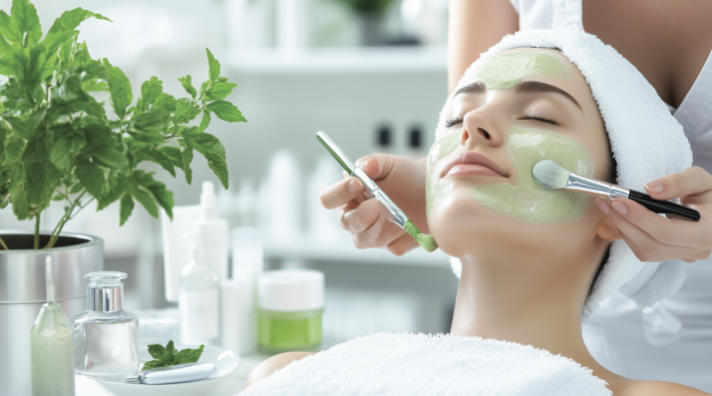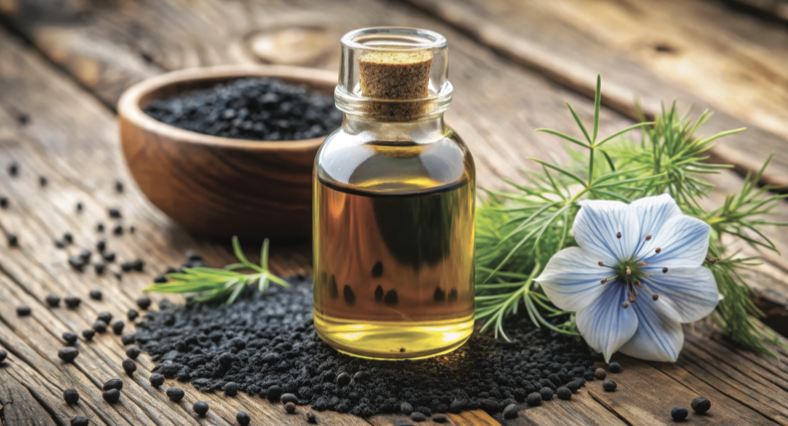Meet the plants that are packing bigger, better benefits into clean skincare right now.
Plant-based skincare has reached new levels of sophistication.
Granted, it seems absurd to use the word “new” when it comes to plants, especially since they’ve been used in traditional remedies for centuries. But as botanical beauty devotion grows, science too picks up speed, directing sophisticated studies around plants’ health-promoting properties and refining how we can manipulate them.
“Plants create compounds such as polyphenols, polysaccharides, and enzymes to fight their own stress, heal damage, and thrive in harsh conditions,” explains Dr. Shuting Hu, biologist and cosmetic chemist, who founded her clean skincare brand, Acaderma, after extensively investigating the most efficacious botanicals. “We’re continuing to learn how those same abilities help our skin, and the opportunities are vast.”
In the scientific deep dive into what nature has to offer, four ingredients in particular are stealing the spotlight: pomegranate, algae, mushrooms, and black cumin seed oil. Clean beauty pioneers are tapping their benefits, so worthy, they say, of adding to your routine, starting now.
“Pomegranate oil truly stands out because it’s a powerhouse of punicic acid, a rare omega-5 fatty acid that promotes the production of collagen fibers.”
—Shrankhla Holecek, founder of UMA Oils, Ayurvedic plant-based skincare

Pomegranate
“Pomegranate oil truly stands out because it’s a powerhouse of punicic acid, a rare omega-5 fatty acid that promotes the production of collagen fibers and slows the processes that break them down,” explains Shrankhla Holecek, founder of UMA Oils, Ayurvedic plant-based skincare. “This helps prevent wrinkles, and encourages the healing of acne, wounds, and scars.”
The oil’s benefits extend beyond collagen production, too. Packed with vitamins, pomegranate oil nourishes skin. Its antioxidant content, including polyphenols like ellagic acid, helps protect against free radicals, reducing sun damage and other signs of aging like discoloration. Studies have also shown its ability to regenerate skin cells. “What’s exciting is that modern cold-pressing technologies are able to retain the oil’s potent properties, while advanced emulsification techniques improve its absorption into the skin,” says Holecek.
Of course, Holecek includes pomegranate in the skin oils she produces. UMA Absolute Anti Aging Face Oil incorporates the fruit to moisturize, improve elasticity, and enhance the natural lipid barrier. For a full-body boost, UMA OUD Allure Body Oil combines pomegranate with Oud oil, beloved for its spiritual and therapeutic qualities, including a rich aroma that helps calm your senses.
You’ll also get a good dose in Weleda’s Plumping Face Care Collection, a line that combines pomegranate seed oil with maca root peptides to reduce wrinkles and give your complexion a nice bounciness. To exfoliate, Éminence Organic Skin Care Cranberry Pomegranate Sugar Scrub blends the fruit with natural sugar as a buffer. And for a brilliant, quick hydrator with antioxidant support, Melach 33’s Hyaluronic Botanical Mist pairs pomegranate seed and grapeseed oils with hyaluronic acid.
“The enzyme photolyase, derived from blue-green algae, is a light-activated repair system that targets DNA damage caused by UV rays.”
—Dr. Shuting Hu, biologist and cosmetic chemist, who founded her clean skincare brand, Acaderma

Algae
These marine botanicals are loaded with unique antioxidants, polysaccharides, and proteins, (plus they’re abundantly available, as they grow fast in salt water). Seaweed, for instance, absorbs nutrients from the ocean, providing bioactive compounds such as fucoxanthin and phlorotannins, which aren’t found in land-based plants. These compounds fight oxidative stress, help prevent collagen breakdown, and support skin elasticity. “I personally bathe with rehydrated seaweed to get the skin healing and plumping effects,” says Kimberly Acker, spa director at The Rusty Parrot Lodge & Spa in Jackson, Wyoming. “Mother Nature will not fail us!”
Besides their rare properties, the sea plants operate in ways our bodies simply can’t, according to Dr. Hu. “The enzyme photolyase, derived from blue-green algae, is a light-activated repair system that targets DNA damage caused by UV rays,” she explains. “What’s fascinating is that this mechanism no longer functions in humans but remains active in algae.” Acaderma’s Invisible Shield provides those DNA repair enzymes to prevent photo damage, as well as collagen loss, and boosts skin vitality.
Red algae is the seaweed of choice for Three Ships Brighter Days Red Algae + Avocado Biodegradable Eye Masks because of its ability to guard against pollution. And brown algae has the ability to reduce inflammation, provide antioxidant protection, and stimulate fibroblasts to make collagen. Laminaria digitata and Fucus serratus are both brown algae hand-harvested off the Atlantic coast of Ireland to create VOYA skincare, a brand dedicated to the power of sea plants. According to its scientific studies, the algae in its products enhance collagen production by up to 200% and increase the skin’s ability to fight free radicals by more than 100%, while also improving elasticity and strengthening the barrier. Similarly, True Botanicals SuperSEA Firming & Lifting Treatment uses cutting-edge technology to blend seaweeds and sea minerals from four nutrient-dense marine ecosystems.
For targeted care, Biologique Recherche Oligo-Protéines Marines focuses on reducing dark circles with marine proteins shown to improve circulation and eliminate that blueish tinge in the under-eye area. And to achieve overall hydration and glow, Seaflora Sea Radiance Facial Moisturizer combines sea kelp, with almost a hundred different minerals, kombu, and brown seaweed.

Mushrooms
The world of fungi is enormous, mysterious, and complex—there are more than 14,000 species, for context. And as we were learning more about their healing properties, experts have come to understand how they can work magic on your skin. In fact, according to recent research, certain types may prevent collagen erosion, tame inflammation, and correct hyperpigmentation.
“There are select species favored for their topical benefits,” says Dr. Hu, who explains that among the standout varieties, the tremella or snow mushroom shines for its ability to hold up to 500 times its weight in water, delivering intense hydration. Chaga mushrooms, high in antioxidants, block enzymes that cause dark spots and hyperpigmentation, while reishi mushrooms, rich in polysaccharides, antioxidants, and anti-inflammatory compounds reduce inflammation and bolster skin elasticity. And thanks to compounds like Kojic acid, shiitakes brighten and depigment.
While formulating Three Ships Dew Drops Mushroom + Kakadu Plum Hyaluronic Acid Serum with tremella mushrooms, Cofounder Connie Lo happened to be visiting her parents and asked if they’d heard of the revolutionary ingredient. “My mom reached into her cupboard and pulled out a bag of them that she added to her Chinese soups for health,” she says. “It’s incredible to see traditional ingredients celebrated for their modern skincare benefits. Mushrooms are definitely worthy of their stardom.” The powerhouse serum deeply moisturizes and reduces fine lines, as well as brightens and firms, due to the addition of vitamin C. Meanwhile, KORA Organics Milky Mushroom Gentle Cleansing Oil uses another species, silver ear mushroom, to bind moisture and nourish stressed skin, making it an ideal first step in a skincare routine.
For barrier repair, Dr. Andrew Weil for Origins Mega-Mushroom Relief & Resilience Soothing Treatment Lotion incorporates reishi and fermented chaga mushrooms. Youth to the People Adaptogen Deep Moisture Cream pairs reishi with ashwagandha and rhodiola for hydration and redness reduction, and Beekman 1802 Mushroom Milk Better Aging Eye Cream targets fine lines and dark circles with a blend of five mushrooms, including lion’s mane and snow mushroom.

Black Cumin Seed Oil
“Cold-pressed from the seeds of the Nigella sativa plant, this oil contains a unique compound called thymoquinone, which, when applied directly to the skin, may stimulate tissue growth and facilitate wound healing,” explains Dr. Hu. “Black cumin seed oil is also great because of its anti-inflammatory and antimicrobial properties, making it very effective for treating skin irritations.”
For these reasons, the oil is especially beneficial for acne-prone or sensitive skin, helping to reduce clogged pores, control oil production, and calm redness and inflammation. It’s also supremely nourishing, packed with vitamins and fatty acids, which work together to restore skin buoyancy, diminish fine lines, and fade dark spots. Research even points to its potential for improving eczema symptoms when used consistently.
These days, the ancient ingredient is finding its way into modern skincare due to its versatility. Éminence Organic Skin Care Charcoal & Black Seed Clay Masque uses the combo of ingredients to unblock pores and absorb excess sebum. And for the skincare minimalist, Amazing Herbs Black Seed Miracle Skin Repair Cream brings together black cumin seed oil, vitamin E and other botanicals to supply nutrients, and moisture to both your face and body.
For anyone who is blemish-prone, the oil is a godsend—battling acne with the double whammy of those potent antimicrobial and anti-inflammatory compounds without overdrying the complexion. Sunday Riley U.F.O. Ultra-Clarifying Acne Treatment Face Oil combines black cumin seed oil with salicylic acid to gently exfoliate and treat breakouts; Pai Carbon Star blends black cumin seed oil with vegetable charcoal to purify and buff while being particularly kind to sensitive types. And Odacité BL+C Pimples Serum Concentrate, another standout, pairs black cumin with cajeput oil to combat blemishes and give you clear, radiant skin.
The post Spring’s Skin Superstars appeared first on Organic Spa Magazine.

